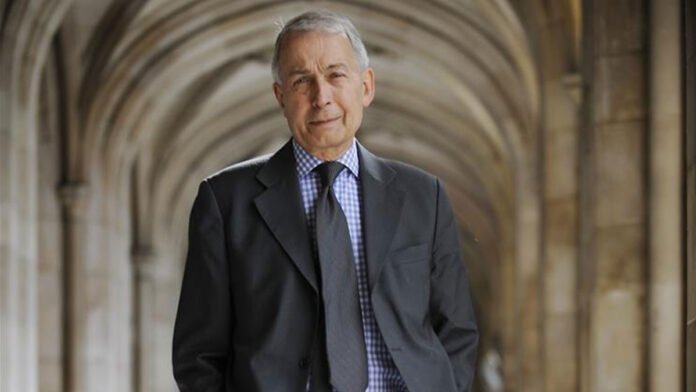A Politician’s Highest Calling: Remembering Frank Field
I always believed that one of the main jobs of any politician, no matter which party, was to work toward the betterment of the people they represented. This can come in many forms, from workers’ rights to infrastructure, but nowhere is that job more worthy than when it is to lift the poor and downtrodden from their anguish. In that, Frank Field excelled.
The passing of Frank Field at the age of 81 marks the loss of one of Parliament’s most resolute and principled voices. For over four decades, Lord Field dedicated himself to being the moral conscience of Westminster, championing the most vulnerable in society with unwavering conviction.
As director of the Child Poverty Action Group and the Low Pay Unit, Field spent more than a decade campaigning on behalf of the poorest in society, while seeking a seat in Parliament.
In 1979, he was elected to represent the safe Labour seat of Birkenhead – which he held for the next 40 years.
Tributes have poured in from across the political divide, united in praise for a man whose “uncomfortable principles” and “unshakable moral compass” meant he could never be constrained by conventional dogma or party lines. Tony Blair, under whose government Field served as welfare reform minister, lauded his “integrity, intelligence and deep commitment” as well as being an “independent thinker” always “pushing at the frontier of new ideas.”
It was this fierce independence of thought that defined Field’s career from the outset. Having directed the Child Poverty Action Group in the 1970s, the scourge of child deprivation became his life’s work when elected MP for Birkenhead in 1979. His advocacy shone a harsh light on the often-unspoken toll of inequality, tackling issues like modern slavery, welfare reform, and social mobility head-on through numerous committee roles and legislative efforts.
Yet Field’s true strength lay in his ability to transcend partisan politics through the purity of his moral certitudes. Even Tories like Priti Patel praised his “unwavering moral compass” and commitment to “working cross-party.” Former justice secretary Robert Buckland extolled the Field’s “blend of compassion, thoughtfulness, decency, shot through with steel.” It was this ethical clarity, this refusal to compromise on principles over politics, that elevated Field into a parliamentary icon admired across all aisles.

His disillusionment with the Labor Party under Jeremy Corbyn’s leadership, resigning the whip over its “nastiness” and ‘antisemitism’, underscored Field’s staunch rejection of moral relativism.
He fought the 2019 general election as an independent, although he continued to pay his Labour membership fee on a voluntary basis. He formed his own Social Justice Party, only to lose his Birkenhead seat, Field displayed his integrity to the bitter end, unwilling to compromise his convictions even for re-election.
On 22 October 2021, Baron Field of Birkenhead announced that he was terminally ill and had recently spent time in a hospice.
That the terminally ill Field used his final breath to advocate for assisted dying, steadfastly arguing that “before the full horror effects set in” the incurably sick should have that “opportunity,” epitomised his life’s work – giving voice to the vulnerable, facing society’s uncomfortable ethical dilemmas head-on with empathy and reason.
To those “lucky enough to have enjoyed his laughter and friendship,” Frank Field’s passing leaves an absence that cannot be overstated. An intellectual titan and parliamentary giant, he strode the halls of Westminster as an ethical lodestar, a truly independent mind whose dogged principles always took precedence over partisan politics or personal interest.
While the Labour minister-turned-crossbench peer is gone, Field’s dedication to social justice and human dignity must endure as a moral impetus for future generations. As admirer, Chris Bryant noted, Field’s example proved that uncomfortable principles can indeed improve politics. In remembering this resolute man of conviction, we honour his legacy by internalising his compassionate conscience as our own – a call to uncompromising morality that must never be silenced.
It really doesn’t matter which side of the political spectrum we stand on. We should all honour the passing of those who legitimately fight for the relief of the vulnerable in our society.
Support Independent Journalism Today
Our unwavering dedication is to provide you with unbiased news, diverse perspectives, and insightful opinions. We're on a mission to ensure that those in positions of power are held accountable for their actions, but we can't do it alone. Labour Heartlands is primarily funded by me, Paul Knaggs, and by the generous contributions of readers like you. Your donations keep us going and help us uphold the principles of independent journalism. Join us in our quest for truth, transparency, and accountability – donate today and be a part of our mission!
Like everyone else, we're facing challenges, and we need your help to stay online and continue providing crucial journalism. Every contribution, no matter how small, goes a long way in helping us thrive. By becoming one of our donors, you become a vital part of our mission to uncover the truth and uphold the values of democracy.
While we maintain our independence from political affiliations, we stand united against corruption, injustice, and the erosion of free speech, truth, and democracy. We believe in the power of accurate information in a democracy, and we consider facts non-negotiable.
Your support, no matter the amount, can make a significant impact. Together, we can make a difference and continue our journey toward a more informed and just society.
Thank you for supporting Labour Heartlands












